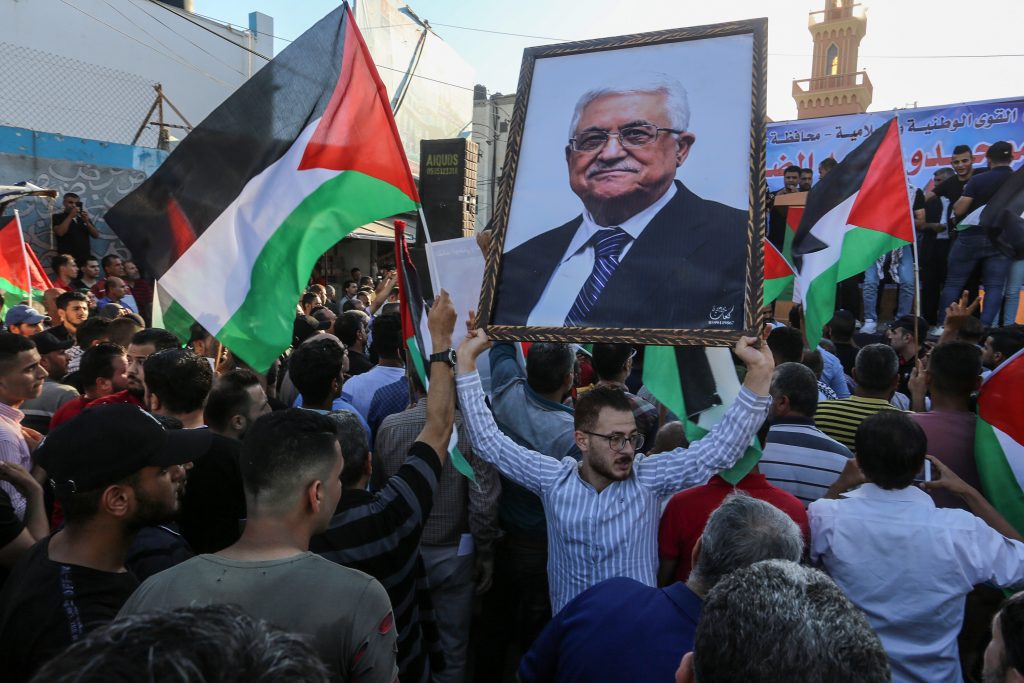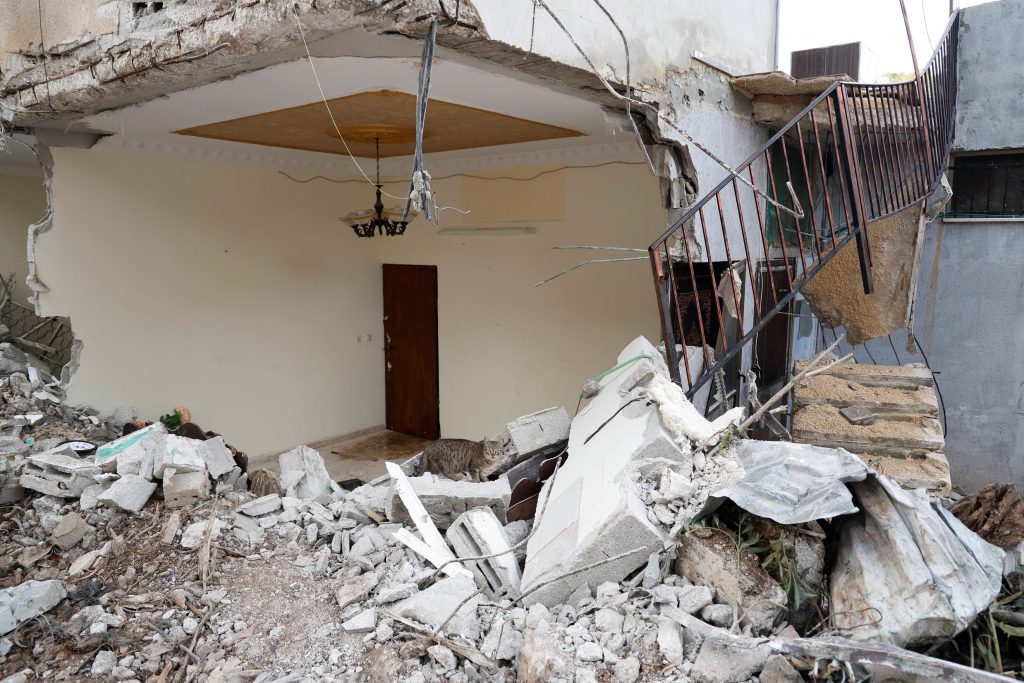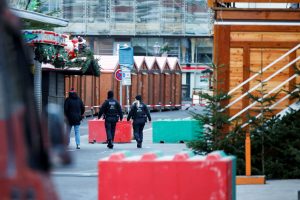RAMALLAH, West Bank—Whenever Mahmoud Abbas is quizzed about who he wants as his successor, the 88-year-old president of the Palestinian Authority gives his standard reply: no one yet.
His father lived to over 100, so why fret about finding a replacement, an Egyptian official recalls Abbas responding to the longstanding question of his succession.
“He is convinced he has another 20 years to go,” a former Abbas staffer said.
Abbas has ruled the Palestinian Authority as leader of Fatah, its largest party, for almost two decades and hasn’t faced general elections since 2006. His poll ratings are on the floor, with 90% of Palestinians calling for his resignation and the authority he leads widely viewed as ineffective and corrupt.
His insistence on staying in power is snarling plans for Gaza , where the U.S. and its Arab allies want the Palestinian Authority, which controls parts of the Israeli-occupied West Bank, to govern in place of Hamas after the war with Israel.
 In the months before the Oct. 7 Hamas attacks on Israel and the response it provoked, the Palestinian Authority was in a fight for its life , cracking down, sometimes violently, on political rivals and militants from groups such as Hamas and Islamic Jihad, who challenged its flimsy grip on power.
In the months before the Oct. 7 Hamas attacks on Israel and the response it provoked, the Palestinian Authority was in a fight for its life , cracking down, sometimes violently, on political rivals and militants from groups such as Hamas and Islamic Jihad, who challenged its flimsy grip on power.
And while the authority is the only candidate Western and Arab officials have for the herculean tasks of rebuilding Gaza and replacing Hamas, there are mounting questions as to whether Abbas and the West Bank leadership is fit for purpose.
Israeli Prime Minister Benjamin Netanyahu has spoken against a role for the authority in Gaza after the war but hasn’t set out an alternative.
In public, the U.S. says that a revitalized Palestinian Authority should govern both the West Bank and Gaza, and that Abbas’s office has ideas for changes that are a “step in the right direction.” In private, Western and Arab officials say revitalization means removing Abbas as president or at least draining his powers.

A cat stands on rubble after an Israeli raid, at Nour Shams refugee camp in Tulkarm, in the Israeli-occupied West Bank, January 18, 2024. REUTERS/Raneen Sawafta
Talks between Palestinian factions, Arab states and the U.S. have included discussions about potential successors, according to people involved in the discussions. Among those mentioned are a former Palestinian Authority prime minister, Salam Fayyad; the exiled former Gaza security chief Mohammed Dahlan; and Marwan Barghouti , a popular Palestinian leader jailed since 2002 and serving multiple life sentences for his alleged involvement in the killing of Israelis.
Fayyad said he had heard that some in the U.S. government would support his appointment but that he hasn’t been approached.
Dahlan, who has been described by U.S. officials as a key player in Gaza’s future , said he doesn’t want to lead in Gaza but would seek for the party he founded to run in the next Palestinian election. “I am not looking for a job,” Dahlan said in an interview.
Barghouti refused to recognize the Israeli court that tried him and didn’t present a defense. He couldn’t be reached for comment.
Abbas, meanwhile, is refusing to accept reforms that would diminish his strength and make a Palestinian Authority takeover acceptable to both Israelis and Gazans, according to Arab officials. A spokesman for Abbas denied that the president was a block to progress and blamed Israel’s occupation of the West Bank and U.S. support for Israel for the lack of stability in the Palestinian territories.
Abbas is diplomatic but not charismatic, says Yossi Beilin, a former Israeli deputy foreign minister who worked with him to craft the Oslo Accords in the 1990s, the last major peace deal between Israeli and Palestinian leaders.
A bureaucrat, Abbas stood alongside Yasser Arafat , the Palestine Liberation Organization leader, at the signing of those accords. “Abbas was the antithesis to Arafat in many ways,” Beilin says. He dressed in a suit, Arafat wore military uniform; Abbas held a strong commitment to nonviolent routes to statehood, Arafat backed the use of force if talks failed.
But those differences were instrumental to getting the accords over the line, Beilin says. “They balanced each other out.”
Today, Abbas, who didn’t respond to a request to be interviewed for this article, is regarded more as a dead weight by Western nations and their allies. He is increasingly undermined by Hamas, the U.S.-designated terror group that violently opposes his pursuit of Palestinian statehood through dialogue with the West and, at times, Israel.
For years, that dynamic has posed a conundrum for Western nations, including the U.S.: Support elections with the chance Hamas wins, or continue to back an unpopular ruler who hasn’t faced a general election for 18 years.
Oct. 7 and the subsequent surge in support for Hamas changed that calculation, Middle East analysts say, making an overhaul of the Palestinian Authority a priority.
One workaround discussed by U.S. and Arab negotiators is to push Abbas to appoint a new prime minister with greater executive power, according to Egyptian officials. But the president recognizes that play, the officials say. He became the Palestinian Authority’s first prime minister in 2003, a move spearheaded by the U.S., which sought a closer partner than it had in Arafat.
After Arafat’s death, when Abbas became president in 2005 after Hamas boycotted elections, he stripped power from the prime minister’s office—a post held by five men during his presidency so far.
“He always viewed the position of prime minister with a great deal of suspicion,” said Diana Buttu, a former Palestinian peace negotiator who worked under Abbas.
Although Abbas says he won’t be replaced through elections, he has told Arab and U.S. officials that he would be open to forming a new government with Mohammad Mustafa, a former Palestinian economy minister and World Bank executive, who isn’t viewed as a threat to the president, according to Arab officials. On Sunday, he appointed two new security officials as part of an overhaul to his government and Arab officials say he is expected to travel to Doha, Qatar this week to present a plan for the reconstruction of Gaza after the war.
Born in 1935 in Safed, a city in what is now northern Israel, Abbas fled with his family to Syria during the founding of Israel in the late 1940s, one of more than 720,000 Palestinians displaced by the creation of the newly declared nation-state. He later moved to Qatar, where he became involved in political organizing.
Abbas dislikes the limelight, those who know him say. He often slipped out of meeting halls by unusual exits—including through a window—to avoid being approached at crowded doorways, Beilin said.
In one incident, while Abbas was moving away from a crowd, his finger was severed after getting caught in a car door, the former Israeli diplomat said.
“He is a shy guy, that’s the bottom line,” Beilin said.
His rise as a senior member of Fatah saw him become a close associate of Arafat. But, lacking the PLO leader’s rapport with ordinary Palestinians, Abbas has never achieved the same standing and struggled to shake off his reputation as a U.S.-backed appointee, analysts say.
Much of that reputation stemmed from Abbas’s insistence that if the Palestinian movement eschews violence, the U.S. will pressure Israel on issues including the Israeli settlements and a path to Palestinian statehood, according to analysts and former staffers.
“Abbas has put all his eggs in the American basket, thinking that the U.S. will rescue him and deliver a peace process that will bring a two-state solution,” said Khaled Elgindy, a senior fellow at the Middle East Institute, a think tank in Washington, D.C. “But the U.S. has historically looked at Palestinian politics through its own self-interest, and through a distinctly Israeli lens. So, Abbas’s strategy was and continues to be a failure.”
After Oct. 7, popular Palestinian support for Hamas swelled in the West Bank, in part because the attacks electrified the push for statehood that had fizzled under Abbas, said Khalil Shikaki, director of the Palestinian Center for Policy and Survey Research.
But with Netanyahu ruling out support for a Palestinian state, “The international community is back to the old drawing board, with no fresh ideas,” Shikaki said.
Much may now depend on whether Abbas can be persuaded to step aside or at least give up some of his authority—and who might replace him.
Write to Omar Abdel-Baqui at omar.abdel-baqui@wsj.com and Summer Said at summer.said@wsj.com


